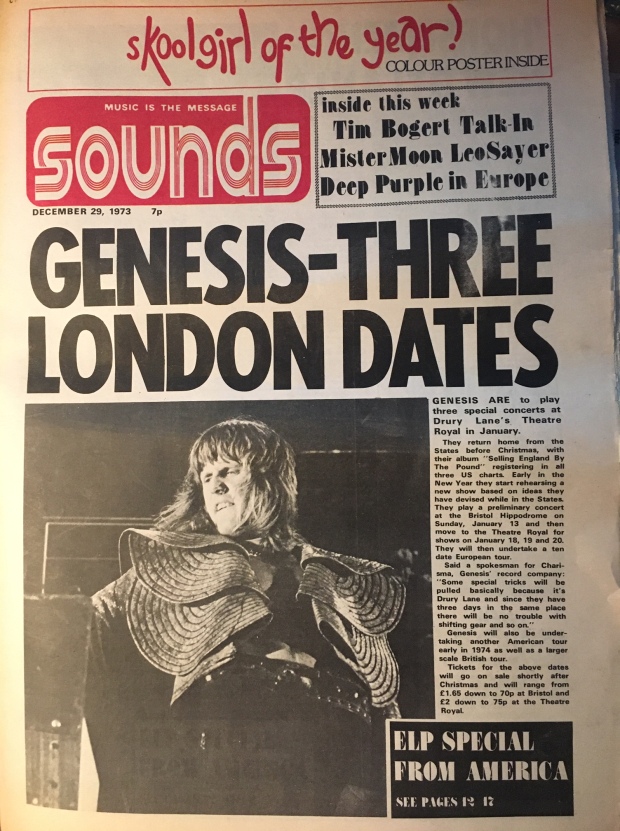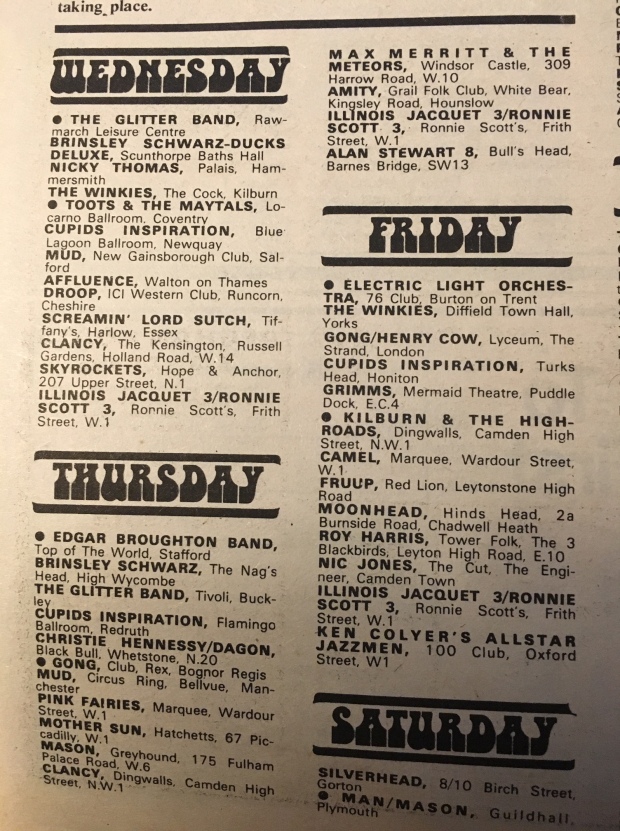I don`t know what is happenning. Lately I have had a peak in the number of views on this blog, but the number of visitors have stayed the same… I can see that I have a lot of views from the USA, so someone over there must be reading this blog extremely thoroughly. Well, to that someone: It seems you enjoy this as much as the rest of us do and I hope that you will take much pleasure in this one from the days when Queen still were a fairly unknown entity.

Queen street
Erskine does it again! This week, Queen`s drummer Roger Meddows Taylor
Gosh it would be so easy but I don`t think I can trash on a man who says he hated “Bridge Over Troubled Water” even if he does fruit about with a band who, it has been decided, are the new persona non grata.
Are Queen really that obnoxious? You tell me. I wouldn`t rightly know, never having heard them you see. I tried but the albums never arrived in time. They were despatched no doubt, strapped to the horny hindquarters of a rheumatic tortoise still making its way past Victoria Station.
So anyway, at least they`ve inspired extremes of opinion and a predominantly negative reaction from the press all of which is good for business because then the kids who buy the albums and go to the gigs can feel that they know something we don`t – and they could just be right.
A rather smug lady who figures she discovered the band has finished her interview and is flicking through the papers sneering at this week`s putdowns of her new pets and she also figures she knows something the rest of us don`t and makes quite sure everyone in the office realises it. I tell you, socially your rock clique has to be the most exciting thing since the day the paperclips arrived.
“I don`t pretend to understand the workings of the journalistic mind.” Drummer Roger Taylor`s looking svelte in felt – a black jacket with piped seams festooned with chains and silver coins. There had, it appeared, been a problem with the publicity shots. The one that you won`t be seeing on this page because it was too blurred and boring was officially approved. It had a `yes` scribbled on the back. The shots we are using instead are not approved. The smug lady shrinks in horror at the thought and my o my I`d sure like to stick one on her… Julie Andrews ain`t got nothin` on this doll.
Anyway, it`s hot and clear outside and I would much rather be cruising slowly round South London looking at office girls with trim little jugs and downy earlobes, but onward we go serving and returning the cliches like your verbal Ken Rosewalls.
“There are really only two things that hurt,” he continues, “firstly when we`re called a hype – that`s one thing we`re not. We`re making it in the old-fashioned way which is initially through selling records through playing concerts… enabling the record company to get behind you for the second album. The other thing is that they cast doubts on the musicianship which is one thing we`re really sure about… obviously we think we`re bloody good… oh yes, and we`ve also been accused of being a part of supermarket rock – which is a bit much when you write your own material.
“Considering the abuse we`ve had lately, I`m surprised that the new album has done so well. I suppose it`s basically that audiences like the band.”
Yes, I `spect it is.
“We`ve had the name for four years now, believe it or not – most people don`t – and it was Freddie`s idea. It was just a reflection of the social world we were in at the time, when he and I were working together on Kensington Market – it was good then. In those days there was a pretty eccentric crowd there, people in sombreros and a lot of them were gay and a lot of them pretended to be and it just seemed to fit in. I didn`t like the name originally and neither did Brian, but we got used to it. We thought that once we`d got established the music would become the identity more than the name…”
And how about this “New Zeppelin” tag with you in the States?
“Oh that`s happened here too, but it seems mainly an American thing. We haven`t been there yet but the first album did quite well there. Apparently we`re known to an extent on the East coast and in the South… sorry to go on about journalists but it seems to be a trait to describe any sort of band that the journalist isn`t particularly aware of in relation to other bands.

We`ve been compared to Alice Cooper, Rod Stewart, Zeppelin, Purple… everybody, even Geordie and Nazareth. In fact, Geordie`s album was reviewed the other day and they got accused of sounding like us which made me laugh…
“There must be parallels but we`re not aware of them. Obviously we have our heroes. I personally think Zeppelin and the Who are the two best rock bands in the world. I`ve got all their albums and I`ve listened to them a lot. I still think John Bonham is one of the most underrated rock drummers, so I suppose we`ve absorbed some of that somewhere…”
The debut Queen album was universally ignored but is now selling in increasing quantities whilst “Queen II” has been universally panned and is selling in even larger quantities.
“We took so much trouble over that album, possibly too much, but when we finished we felt really proud. Immediately it got really bad reviews so I took it home to listen to again and thought Christ are they right? But after hearing it a few weeks later I still like it. I think it`s great. We`ll stick by it.
“There are a lot of things on the first album I don`t like, though, for example the drum sound. There are parts of it which may sound contrived but it is very varied and it has lots of energy… but then I think one of the best albums last year was the “Mott” album and that had loads of inconsistencies and rough bits…”
Roger has `O` and `A` levels, a biology degree and is a former dropout from dental college. He also says he learnt from observing such luminaries as Pete Townshend and Ian Hunter who, he says, has “an interesting philosophy”. He is, Taylor adds, “far more intelligent than you might give him credit for”.
We are digressing. Could Roger see himself slipping into a Rick Wakeman lifestyle?
“To be quite honest I`d like to have a house here, one in Cornwall, a house in Greece and move back and forth between them but still be totally involved in music, but perhaps getting to that level removes the necessary paranoia that keeps you going.”
Oh yes and Roger says the stages were too small, the gigs too crowded, and in general the sound was bad on their recent British tour and I have to wonder because, as I say, I know very little about Queen, but to me it seems like rampant craziness to be starting yet another rock and roll band on the rise up the slippery pole at this point in time with all those prospects of marathon Stateside tours and continuing abuse from the press and an image which to say the least, has become a trifle hack-kneed. Although Roger claims it to be totally uncontrived although Zandra Rhodes is their stage costumier which must mean something… perhaps, as the lovely and indubitably Polish Pete Makowski says, that they are trying to straddle two markets at the same time – your progressive can-crushing and your pretty-boy teenscream, but I don`t know. It`s a nice day outside, the public bar awaits me and I have to investigate that torso of a man in his mid-40s and subsequently I have to put the cat out and mow the lawn…

I have personally transcribed this from the original paper. Any errors in the text from the original magazine may not have been corrected for the sake of accuracy. If you have a music-related web-page where this fits – please make a link to the article. With credits to the original writer of the article from all of us music fans!
This number of Sounds also contains articles/interviews with these people: Elton John, Sutherland Brothers & Quiver, Refugee, Mott the Hoople, Uriah Heep, Sweet, The John Peel Column, Little Feat, Sparks, Strawbs, Ducks Deluxe, Alquin, Dr. Feelgood, Jimmy DeWar.
The original music paper this article came from (pictured at the top) is for sale!
1. Send me an e-mail if you are interested. Send it to: geirmykl@gmail.com
2. The offer should be 20 $ (US Dollars) to be considered. (This includes postage).
3. We conduct the transaction through my verified Paypal account for the safety of both parties.










